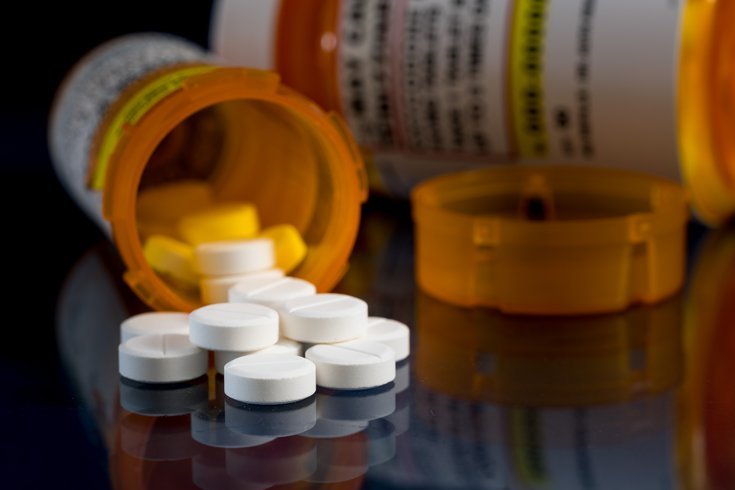
December 21, 2023
 SOURCE/IMAGE LICENSED FROM INGRAM IMAGE
SOURCE/IMAGE LICENSED FROM INGRAM IMAGE
A new genetic test approved by the FDA helps assess the risk of becoming addicted to opioid medications. The FDA says it could be a tool to help address the opioid crisis, but some doctors fear it could have unintended consequences.
A test that uses a cheek swab to assess whether people have an elevated risk of becoming addicted to opioid medications received approval from the U.S. Food and Drug Administration earlier this week. It's being billed as a tool to combat the nation's opioid epidemic, which claimed nearly 80,000 lives last year.
The AvertD test, made by California-based AutoGenomics, is intended only for evaluating adults who may be prescribed short-term opioid pain medications. That includes acute injuries and post-surgical pain management for prescriptions lasting 4-30 days. The test is not designed to screen people with chronic pain.
"The opioid crisis, one of the most profound public health issues facing the United States, calls for innovative measures to prevent, diagnose and treat opioid use disorder, including to assess the risk of developing the disorder," said Dr. Jeff Shuren, director of the FDA's Center for Devices and Radiological Health.
Despite the promise of a screening tool that can flag patients' risk for opioid dependency, some experts caution the test may lead to faulty results. There is concern it could give doctors and patients a false sense of security that opioids will be safe to use, or that it will prevent people from being prescribed non-opioids that may benefit them.
The AvertD test works by analyzing 15 genetic markers that are associated with addiction — reward pathways in the brain that may make people more prone to misusing substances. The test is intended to be used as part of a complete clinical evaluation that accounts for other factors like personal and family history.
Last year, an FDA advisory committee strongly rejected a request to classify AvertD as the first genetic screening tool of its kind to detect the risk of opioid addiction after reviewing an observational study on its accuracy. Though the research demonstrated the test's ability to detect genetic risk factors at high rates, it did not include a safety evaluation or examine its use in clinical settings, FDA officials said.
"We have no idea what the prescribing patterns would be after the test was implemented," FDA panelist Dr. Adam Gordon, who had voted against AvertD, told Medpage Today at the time. "We have no patient-level outcomes. We have no assessment of both providers and patients of how they would approach receiving results of this test. And I think that's a really important point because I'm really worried about the false positives. I believe 100% of the risk associated with this test is with false positives and false negatives."
The FDA ultimately approved a modified version of AvertD and is requiring AutoGenomics to provide training to health care providers to ensure it is appropriately used. The test maker also will need to conduct a large study assessing AvertD's performance in patients and report those results to the FDA.
Shuren said the test's approval, although not without risk, reflects "the urgent need for medical devices that can make a positive impact on the overdose crisis."
Critics contend the genetic markers the test relies on are imperfect measures of addiction risk. Though some people are predisposed to addiction because of their genetic makeup, the way that translates to patient behavior is complex and indirect.
"It's not a simple Mendelian inheritance where one gene has a mutation and that gives you opioid use disorder," Dr. Andrew Saxon, a psychiatry professor at the University of Washington School of Medicine, told CNN Health. "It's a multitude of different genes, all contributing to this effect."
To screen patients for addiction risk, doctors currently use the Opioid Risk Tool — a brief survey that uses patient responses to score their risk levels from low to high. AvertD would not replace the use of that tool, but some experts think it could complicate how doctors and patients weigh self-reported information against the genetic test results.
"The likelihood that a commercially developed genetic test for OUD would have the kind of validity that you would need to really drive clinical practice, based on the broader scientific literature, seems like a stretch," Katherine Keys, a professor at the Columbia University Mailman School of Public Health, told CNN. "If you just ask people, 'Do you have a family history of addiction?' I would hypothesize that that would be a better risk categorizer than this genetic test."
About 6 million people ages 12 and older had an opioid use disorder in 2022, according to the U.S. Department of Health and Human Services. In the last year, the FDA also has approved the first nonprescription and generic versions of naloxone nasal spray.
"The FDA will continue to offer support and expertise to help with the development of medical devices that address the evolving needs of the overdose crisis," Shuren said.